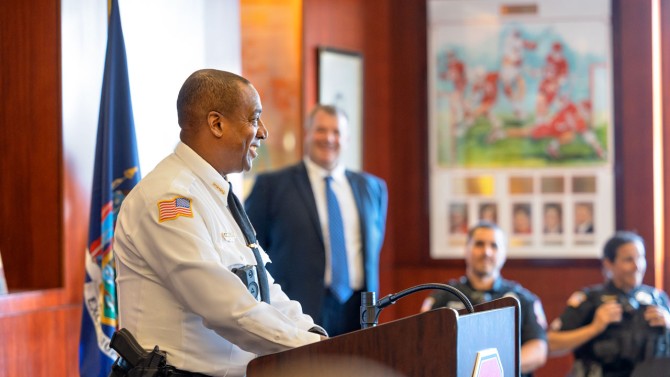Promising to lead with a sense of "equity and commonality" and with "the conscience of Cornell," Anthony Bellamy was sworn in June 22 as chief of the Cornell University Police Department (CUPD).
An 18-year CUPD veteran who previously served as deputy chief, Bellamy said he would strive to be a positive and visible influence within the department and on campus while continuing CUPD's mission of service - by being prepared, responsive and engaging the community.
Anthony Bellamy addresses guests at a June 22 ceremony formally commissioning him as chief of the Cornell University Police Department.
"And engaging the community with a purpose," Bellamy said during an emotional commissioning ceremony in Friends Hall. "We're working with them, listening to community members, making decisions based on what our community needs are."
Bellamy, who joined Cornell as a patrol officer in 2004 and became its first Black police chief April 1, also said he would embody Ezra Cornell's founding values of "any person, any study."
"Today," he said, "I'd like to add, 'any employee.'"
As the police chief overseeing 50 sworn officers, Bellamy will help lead the university's transition to a new public safety model incorporating recommendations from the Public Safety Advisory Committee (PSAC).
The department is now part of the new Division of Public Safety led by David Honan, associate vice president for public safety, who preceded Bellamy as CUPD chief. Initially including CUPD, Cornell's 911 Dispatch Center, Access Control and the Clery Act Compliance Office, the division on July 1 will welcome the Office of Emergency Management and student-led Cornell University Emergency Medical Service.
This fall, Honan said, the division will begin implementing an alternative model for responding to issues that don't require armed officers, as recommended by the PSAC. He said the university's public safety approach is committed to enhancing quality of life by fostering a safe and secure environment while respecting the dignity of all community members.
"Chief Bellamy embodies these principles and mentors his staff on why we are here, what a caring community looks like, and measures success not by the number of arrests," Honan said, "but by having pride in watching thousands of students each year graduate from Cornell, knowing we had a role in their success."
Joanne DeStefano, executive vice president and chief financial officer, said the university's new public safety model would enable more coordinated responses to events on campus. And she recalled the resounding cheers Bellamy received from colleagues at a March event announcing the new structure and his promotion.
"He represents the values of Cornell Police and the new public safety organization," DeStefano said. "You're approachable to all populations on this campus. You're respected for your knowledge. And most important, you're a good person."
Previously as deputy chief, Bellamy commanded patrol operations, major investigations, crime prevention, community engagement and, over the last year, special projects, the training unit and CUPD's accreditation program. Before that he served as a patrol officer, investigator, uniformed sergeant, major investigations unit sergeant and patrol operations lieutenant. While at CUPD, Bellamy earned a bachelor's degree in criminal justice systems from Keuka College in 2008 and a master of public administration from Marist College in 2015.
Bellamy's elder son pinned a gold chief's badge to his uniform before he formally took an oath of office, promising to support the U.S. Constitution, laws of New York state and rules of Cornell, and to be ready to confront danger in the line of duty. Applause and hugs followed.
Thanking his family, Bellamy, at times choking up or wiping away tears, said it was a moment he hadn't expected to come. Like his colleagues, he said, he'd just focused on doing his job.
"That's what we do," Bellamy said. "We go out and we work every day and try to keep our community safe."







